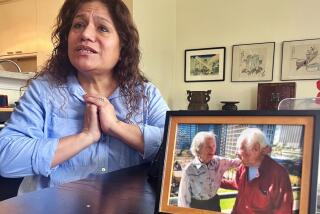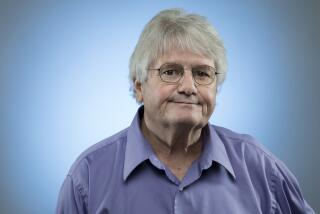The Energy Out There
- Share via
Rain was falling outside my window and Beethoven was playing on my stereo the morning I was informed that Bill Strobel had died. He’d have loved it.
Bill understood ambience and would have appreciated the mood that rain and classical music create when death is an element of the trio.
Its melancholy is so obvious he would have found humor in it, the way we laugh today at the campy old Frankenstein movies, with their thunder and lightning and howling winds.
Bill would have bristled, however, at the manner in which the news of his death was transmitted, via e-mail, because, at age 69, he would have no truck with things that were not conveyed over the telephone or pounded out on an old Underwood.
But he understood, too, that you can’t have everything.
Cancer took my old friend as it has taken so many of my generation, draining their personas in the process of killing and leaving skeletal outlines of who they once were.
That wasn’t so in Bill’s case. Remarkably, he remained who he had always been, an amused, easy-going, pipe-smoking guy who seldom worked at anything too hard but found a kind of unique pleasure in whatever he did.
He was a contributor in his world, offering comfort and ideas to his friends and easy, understated prose to the newspapers for which he worked.
Bill was a gentle person, unable to seriously condemn even those who bedeviled him, including an assistant managing editor we once shared who died and, we were certain, went on to guard the gates of hell.
The editor’s name was Stanley Norton. When Bill learned that his cancer was terminal he telephoned to say he didn’t mind dying but he hated the idea of seeing Norton again.
*
It was just the way he did things. Impending death was something to be dealt with but not brooded over. No one ever faced it in a more graceful manner.
“Are you ready for this?” he asked when he called. “I’m dying.” Then, to my stunned silence, added, “I’m glad I learned of it now before I made an appointment to have my teeth cleaned. I mean, what would be the point?”
He laughed easily while I groped for words, but when his laughter faded I sensed his sorrow. “I have only six months left,” he said. “It all boils down to that. Half a year. What’s that, 180 days?”
I flew to San Jose the following weekend. He lived alone in a small condo on the edge of the city. His wife had died of brain cancer several years ago, and now it was taking Bill’s life.
“You think it’s catchy?” he asked as we sat in a cluttered room of his home. He lighted his pipe, the match burning down to the edge of his fingertips. It’s a memory I’ll always have, of him lighting and relighting a pipe, and watching with fascination as fire burned closer to his skin.
“I don’t know,” I said. “They think it might be caused by a virus.”
“I promise I won’t sneeze,” he said.
We talked about the old days at the Oakland Tribune, where Bill was a suburban reporter, offering languid tales of life on the rim of reality.
They brought him downtown for a year, but he lacked the fire and speed for rewrite and quit to join then-Gov. Ronald Reagan’s press staff. But he lacked the edge for politics too and eventually went back to newspapering in San Jose.
*
I saw him last in September. The leaves of the trees that surrounded his condo had fallen to form pathways that crunched under our feet.
We walked through the pale afternoon on that last visit. He was 20 pounds lighter, but it hardly showed. “It’s funny,” he said, “how cancer can take the flesh from your bones but not touch your pot.”
“I guess it’s a form of selective deterioration,” I said.
He nodded. “It’s like why does the hair on your head fall off and your beard keep growing?”
We were laughing when he stopped suddenly and said, “What do you suppose happens after you die?”
He let the question linger in the crisp autumn air as he lighted and relighted the pipe, trying at first to shield the fire from the wind and finally giving up.
“What do you think happens?”
“The energy’s got to go somewhere,” he said. “I like to think there’s a place out there where maybe we begin again. The universe is so perfect and so beautiful. We can’t just disappear.”
I left him standing in that universe, amid the fallen leaves and the pale sunlight, trying to light his pipe. On Saturday a mutual friend e-mailed me to say Bill had died.
But I know better. There’s simply been a transference of energy from the Earth to a place out there for a gentle, easy-going guy with a whimsical sense of humor. It won’t be anywhere near Stanley Norton.
More to Read
The biggest entertainment stories
Get our big stories about Hollywood, film, television, music, arts, culture and more right in your inbox as soon as they publish.
You may occasionally receive promotional content from the Los Angeles Times.










